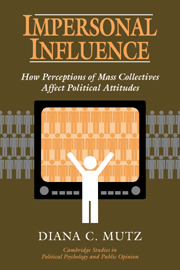Book contents
- Frontmatter
- Contents
- List of Figures
- List of Tables
- Preface
- Acknowledgments
- Part I Theory and Historical Context
- Part II Effects of Perceptions of Mass Experience
- Part III Effects of Perceptions of Mass Opinion
- 6 When Does Success Succeed? A Review of the Evidence
- 7 The Social Psychology of Impersonal Influence from Collective Opinion
- 8 The Role of Collective Opinion in Individual Judgment: Processes and Effects
- Part IV Conclusion
- Appendix: Methodology
- References
- Index
7 - The Social Psychology of Impersonal Influence from Collective Opinion
Published online by Cambridge University Press: 05 June 2012
- Frontmatter
- Contents
- List of Figures
- List of Tables
- Preface
- Acknowledgments
- Part I Theory and Historical Context
- Part II Effects of Perceptions of Mass Experience
- Part III Effects of Perceptions of Mass Opinion
- 6 When Does Success Succeed? A Review of the Evidence
- 7 The Social Psychology of Impersonal Influence from Collective Opinion
- 8 The Role of Collective Opinion in Individual Judgment: Processes and Effects
- Part IV Conclusion
- Appendix: Methodology
- References
- Index
Summary
In studying effects that flow from perceptions of mass opinion, the often inconsistent evidence is rendered even less interpretable by the lack of a theoretical framework suggesting who should be most susceptible, when, and under what conditions. The blunt prediction of social determinism sheds little light on the subtleties of social influence and corresponds poorly with available evidence. Most research has focused on establishing whether such an effect exists without articulating or examining the process by which it occurs. In a research area rife with inconsistent findings, it is particularly important for research to focus on process. Studies establishing a mechanism of influence will promote an understanding not only of why an effect occurs, but also when and why it does not according to some underlying model.
In this manner, seemingly inconsistent evidence can hopefully be rendered interpretable, and reliable predictions can be made. In this chapter, I analyze the most promising psychological theories for understanding these phenomena. A major reason for the lack of any cumulative understanding of impersonal influence has been the shortage of social-psychological theories explaining or predicting such effects. Moreover, the search for relevant theories has transpired amidst tremendous cultural concern focused on certain kinds of social influence at the expense of others.
THE EMPHASIS ON CONFORMITY
Researchers looking for theoretical guidance as to why people are influenced by perceptions of mass opinion quite naturally have turned to the literature on conformity.
- Type
- Chapter
- Information
- Impersonal InfluenceHow Perceptions of Mass Collectives Affect Political Attitudes, pp. 197 - 217Publisher: Cambridge University PressPrint publication year: 1998
- 2
- Cited by



